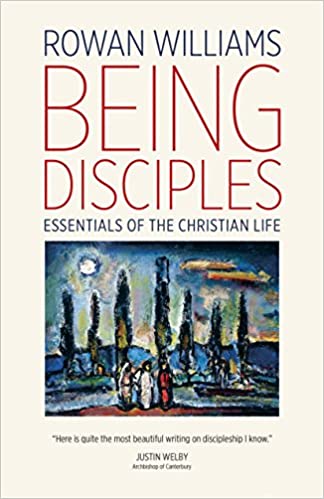This week’s reading is Chapter 5 – Faith in Society – of Archbishop Rowan Williams’s book Being Disciples: Essentials of the Christian Life. The question that Dr. Williams explores is “What place does Christian discipleship have in a modern democratic society?” Historically, there were different answers to the question of a Christian’s role in the world. In the early Church, there was a recognition that God’s kingdom was not of this world (John 18:36), but that Christians were still subject to the governing authorities (Rom. 13). As Jesus says, “Render unto Caesar that which is Caesar’s, and unto God that which is God’s.” Matt. 20:21. In City of God, St. Augustine writes that there are two cities – the City of God in which all of the elect will find eternal salvation and the City of the World, which although necessary to hold back societal chaos, is bound for ultimate destruction. The Christian, he says, should seek out the former even to the neglect of the later. The history of the two kingdoms over the centuries shows how the state attempts to influence the church to give state actions the imprimatur of divine sanction or how the church attempts to influence the state to enforce its understanding of right-belief and right-action. No sooner did Emperor Theodosius (347-395) make Christianity the official religion of the Roman Empire, than he began persecuting non-Nicene Christians.
With the advent of modern liberal democratic governments, there is a somewhat hard separation of the two kingdoms of church and state. In many ways, America pioneered this separation. In his letter to the Danbury (Conn.) Baptist, Thomas Jefferson sought to assure the Baptist congregation that their right to practice their religion was not a matter of tolerance, which could be revoked, but a matter of right, which could not be infringed upon. (At the time, Connecticut had a Congregationalist state church). In his letter to the Hebrew Congregation of Newport (R.I.), George Washington assures them that they are full citizens of the United States which “gives to bigotry no sanction, to persecution no assistance” and “requires only that they who live under its protection should demean themselves as good citizens, in giving it on all occasions their effectual support.” Finally, James Madison in his letter to Edward Livingston (upon the latter’s drafting of the Louisiana penal code) warns against any mixing of church and state (even to the extent that the state should not employ a chaplain) because any coalition between the two necessarily corrupts both.
With the wall of separation, what role does the church, and particularly the Christian disciple, play in civil society? Are we to simply keep our religion in our churches, and not allow our discipleship to affect our public actions? Should we simply keep our religion private and to ourselves? For Dr. Williams, the Christian’s role in society is to continuously remind society and particularly the powers in society that (1) all people are of equal value and have inherent dignity and (2) that we are dependent upon each other. Human beings are not simply the cogs of an economic system and we cannot simply ignore the plights of others. Likewise, in the face of moral relativism, Christian disciples must also teach that these values are universal and fundamental in any just society. If Christian disciples stay on the sidelines, then we concede the conversation to those who may say that only economics or only the individual matter in policy discussions.
In some ways, Dr. Williams undersells the importance of Christian discipleship in the public arena. Most of the great social movements in the United States began and were sustained by Christian disciples seeing political causes as putting their faith in action. The abolitionist movement was generally driven by Christian disciples. The civil rights movement began and was organized in churches. The great social-economic movements in the early 20th century, from the abolition of child labor to minimum wage laws and the safety net of social security, were driven by churches, like the Methodist or Christian disciples like the Episcopalian and Labor Secretary Frances Perkins.
Outside of politics, Christian disciples have often been the driving forces behind those private entities that reach out to and care for the least in society. Most hospitals and universities were founded by churches. In our own community, most of our non-profits that uphold the dignity of every human being and bring us together as community – Community Kitchen, New Directions, Helping Hand, etc. – are the product of Christian discipleship.
The question for each of us, is where does our Christian discipleship lead us to be involved in politics or in society? If we engage in politics, how do we avoid being captured by politics? What examples of Christian discipleship in action in society do we see today?
O Lord our Governor, whose glory is in all the world: We commend this nation to thy merciful care, that, being guided by thy Providence, we may dwell secure in thy peace. Grant to the President of the United States, the Governor of this State, and to all in authority, wisdom and strength to know and to do thy will. Fill them with the love of truth and righteousness, and make them ever mindful of their calling to serve this people in thy fear; through Jesus Christ our Lord, who liveth and reigneth with thee and the Holy Spirit, one God, world without end. Amen. 1979 BCP 820

